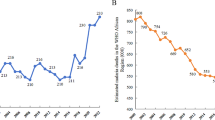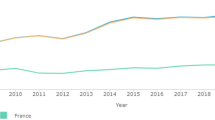Abstract
Among the Plasmodium species that infect humans, P. falciparum has been largely studied in malaria endemic areas. However, P. malariae infection is less documented among the human population. This study aimed to monitor the prevalence and distribution of P. malariae in Southern Benin. A cross-sectional survey was conducted in rural localities in the Ouidah–Kpomasse–Tori Bossito (OKT) health district in Southern Benin from June to October 2019. Socio-demographic data were collected using a questionnaire, while malaria infection data were obtained on the one hand by microscopy diagnosis and, on the other, by nested polymerase chain reaction (PCR). Based on microscopy, the prevalence of P. malariae mono-infection and coinfection of P. falciparum, P. malariae was respectively 2.3% and 1.2% in the OKT health district. This prevalence was higher (P < 0.01) than that reported by Damien et al. (2010) 10 years ago in the same study area with 0.7% and 0.3% of P. malariae and P. falciparum/P. malariae, respectively. Based on PCR analysis, P. malariae prevalence was 14.1%, including 5.2% of mono-infection and 8.9% of mixed infection with P. falciparum. Sub-microscopic Plasmodium infections were high (30.6%) and more pronounced in older participants (>20 years). The present study revealed that P. malariae increased in the OKT health district with a high prevalence of submicroscopic infection. Since our results provide valuable evidence of increasing P. malariae infection, the National Malaria Control Programs (NMCPs) must consider P. malariae when designing future measures for effective control and malaria treatment.







Similar content being viewed by others
Data Availability
All data generated or analyzed during this study are included in the article.
References
Adomako-Ankomah Y, Chenoweth MS, Durfee K et al (2017) High Plasmodium falciparum longitudinal prevalence is associated with high multiclonality and reduced clinical malaria risk in a seasonal transmission area of Mali. PLoS One 12:1–15. https://doi.org/10.1371/journal.pone.0170948
Amoah LE, Donu D, Abuaku B et al (2019) Probing the composition of Plasmodium species contained in malaria infections in the Eastern region of Ghana. BMC Public Health 19:1–11. https://doi.org/10.1186/s12889-019-7989-1
Bejon P, Williams TN, Nyundo C et al (2014) A micro-epidemiological analysis of febrile malaria in coastal Kenya showing hotspots within hotspots. Elife 2014:1–13. https://doi.org/10.7554/eLife.02130
Bernabeu M, Gomez-Perez GP, Sissoko S et al (2012) Plasmodium vivax malaria in Mali: a study from three different regions. Malar J 11:1–6. https://doi.org/10.1186/1475-2875-11-405
Betson M, Sousa-Figueiredo JC, Atuhaire A et al (2014) Detection of persistent Plasmodium spp. infections in Ugandan children after artemether-lumefantrine treatment. Parasitology 141:1880–1890. https://doi.org/10.1017/S003118201400033X
Bousema T, Drakeley C (2011) Epidemiology and infectivity of Plasmodium falciparum and Plasmodium vivax gametocytes in relation to malaria control and elimination. Clin Microbiol Rev 24:377–410. https://doi.org/10.1128/CMR.00051-10
Brazier AJ, Avril M, Bernabeu M, et al (2017) Pathogenicity determinants of the human malaria parasite Plasmodium falciparum have ancient origins. mSphere 2:1–13. https://doi.org/10.1128/msphere.00348-16
Bridges DJ, Winters AM, Hamer DH (2012) Malaria elimination: surveillance and response. Pathog Glob Health 106:224–231. https://doi.org/10.1179/2047773212Y.0000000035
Browne EN, Frimpong E, Sievertsen J et al (2000) Malariometric update for the rainforest and savanna of Ashanti region, Ghana. Ann Trop Med Parasitol 94:15–22. https://doi.org/10.1093/infdis/jix686
Camargo-Ayala PA, Cubides JR, Niño CH et al (2016) High Plasmodium malariae prevalence in an endemic area of the colombian amazon region. PLoS One 11:1–17. https://doi.org/10.1371/journal.pone.0159968
Collins WE, Jeffery GM (2007) Plasmodium malariae: parasite and disease. Clin Microbiol Rev 20:579–592. https://doi.org/10.1128/CMR.00027-07
Damien GB, Djènontin A, Rogier C et al (2010) Malaria infection and disease in an area with pyrethroid-resistant vectors in southern Benin. Malar J 9:1–11
Diallo MA, Badiane AS, Diongue K et al (2016) Non-falciparum malaria in Dakar: a confirmed case of Plasmodium ovale wallikeri infection. Malar J 15:1–6. https://doi.org/10.1186/s12936-016-1485-1
Dinko B, Oguike MC, Larbi JA et al (2013) Persistent detection of Plasmodium falciparum, P. malariae, P. ovale curtisi and P. ovale wallikeri after ACT treatment of asymptomatic Ghanaian school-children. Int J Parasitol Drugs Drug Resist 3:45–50. https://doi.org/10.1016/j.ijpddr.2013.01.001
Doritchamou JYA, Akuffo RA, Moussiliou A et al (2018) Submicroscopic placental infection by non-falciparum Plasmodium spp. PLoS Negl Trop Dis 12:1–17. https://doi.org/10.1371/journal.pntd.0006279
Ehrich JHH, Eke FU (2007) Malaria-induced renal damage: facts and myths. Pediatr Nephrol 22:626–637. https://doi.org/10.1186/s40168-018-0435-2
Fru-Cho J, Bumah VV, Safeukui I et al (2014) Molecular typing reveals substantial Plasmodium vivax infection in asymptomatic adults in a rural area of Cameroon. Malar J 13:1–11. https://doi.org/10.1186/1475-2875-13-170
S Georges S Viriyakbosola X Ping W Jarra 1993 High sensitivity of detection of human malaria parasites by the use of nested polymerase chain reaction. 61 315 320
Gnémé A, Guelbéogo WM, Riehle MM et al (2013) Plasmodium species occurrence, temporal distribution and interaction in a child-aged population in rural Burkina Faso. Malar J 12:1–9. https://doi.org/10.1186/1475-2875-12-67
B Greenwood 1992 Malaria — obstacles and opportunities Parasitology Today https://doi.org/10.1016/0169-4758(92)90179-6
Idris ZM, Chan CW, Kongere J et al (2016) High and heterogeneous prevalence of asymptomatic and sub-microscopic malaria infections on islands in Lake Victoria, Kenya. Sci Rep 6:1–13. https://doi.org/10.1038/srep36958
INSAE (2018) Cinquième Enquête Démographique et de Santé au Bénin (EDSB-V)
Kotepui M, Kotepui KU, De Jesus Milanez G, Masangkay FR (2020) Plasmodium spp. mixed infection leading to severe malaria: a systematic review and meta-analysis. Sci Rep 10:1–12. https://doi.org/10.1038/s41598-020-68082-3
Langford S, Douglas NM, Lampah DA et al (2015) Plasmodium malariae infection associated with a high burden of anemia: a hospital-based surveillance study. PLoS Negl Trop Dis 9:1–16. https://doi.org/10.1371/journal.pntd.0004195
A Port Le L Watier G Cottrell et al 2011 Infections in infants during the first 12 months of life: role of placental malaria and environmental factors PLoS One 6 https://doi.org/10.1371/journal.pone.0027516
Menard D, Dondorp A (2017) Antimalarial drug resistance: a threat to malaria elimination. Cold Spring Harb Perspect Med 7:1–24. https://doi.org/10.1101/cshperspect.a025619
Mombo-Ngoma G, Kleine C, Basra A et al (2012) Prospective evaluation of artemether-lumefantrine for the treatment of non-falciparum and mixed-species malaria in Gabon. Malar J 11:1–6. https://doi.org/10.1186/1475-2875-11-120
Mueller I, Zimmerman PA, Reeder JC (2007) Plasmodium malariae and Plasmodium ovale – the ‘bashful’ malaria parasites. Trends Parasitol. 23(6):278–283. https://doi.org/10.1016/j.pt.2007.04.009
Okell LC, Ghani AC, Lyons E, Drakeley CJ (2009) Submicroscopic infection in Plasmodium falciparum-endemic populations: a systematic review and meta-analysis. J Infect Dis 200:1509–1517
OMS (2014) Techniques de base pour le diagnostic microscopique du paludisme. Guid du Stag Partie I:
Oriero EC, Olukosi AY, Oduwole OA et al (2020) Seroprevalence and parasite rates of Plasmodium malariae in a high malaria transmission setting of southern Nigeria. Am J Trop Med Hyg 103:2208–2216. https://doi.org/10.4269/ajtmh.20-0593
Ouédraogo AL, Bousema T, De Vlas SJ et al (2010) The plasticity of Plasmodium falciparum gametocytaemia in relation to age in Burkina Faso. Malar J 9:1–8. https://doi.org/10.1186/1475-2875-9-281
Owusu EDA, Brown CA, Grobusch MP, Mens P (2017) Prevalence of Plasmodium falciparum and non-P. falciparum infections in a highland district in Ghana, and the influence of HIV and sickle cell disease. Malar J 16:10–17. https://doi.org/10.1186/s12936-017-1823-y
Peprah S, Tenge C, Genga IO et al (2019) A cross-sectional population study of geographic, age-specific, and household risk factors for asymptomatic Plasmodium falciparum malaria infection in western Kenya. Am J Trop Med Hyg 100:54–65. https://doi.org/10.4269/ajtmh.18-0481
Plowe CV, Djimde A, Bouare M et al (1995) Pyrimethamine and proguanil resistance-conferring mutations in Plasmodium falciparum dihydrofolate reductase: polymerase chain reaction methods for surveillance in Africa. Am J Trop Med Hyg 52:565–568. https://doi.org/10.1016/S0140-6736(19)31097-9
PNLP (2015) Directives nationales de prise en charge des cas de paludisme, Edition révisée
Savi de Tove YS, Hounto AO, Alao MJ et al (2017) Prevalence of Plasmodium falciparum parasitaemia in exclusively breastfed children aged 0–6 month in the Ouidah Kpomassè-Tori-Bossito health region in Benin. J Bacteriol Parasitol 09:0–5. https://doi.org/10.4172/2155-9597.1000332
Schneider P, Bousema JT, Gouagna LC et al (2007) Submicroscopic Plasmodium falciparum gametocyte densities frequently result in mosquito infection. Am J Trop Med Hyg 76:470–474. https://doi.org/10.4269/ajtmh.2007.76.470
Shapiro SS, Wilk MB (1965) An analysis of variance test for normality (complete samples). Biometrika 52:591–611. https://doi.org/10.1093/biomet/52.3-4.591
WHO (2019) Global malaria programme. WHO Regional Office for Africa. vailable from: https://www.who.int/news-room/fact-sheets/detail/malaria.
WHO (2016) World malaria report 2016
WHO (2019) The role of laboratory diagnosis to support malaria disease management Focus on the use of rapid diagnostic tests in areas of high transmission.Report of a who technical consultation, 25-26 October 2004
WHO (2015) Guidelines for the treatment of malaria, Third edition
WHO (2019) Malaria terminology global malaria programme. Available from: http://www.who.int/malaria
WHO (2020) World Malaria Report 2020
P Winskill PG Walker RE Cibulskis AC Ghani 2020 Prioritizing the scale-up of interventions for malaria control and elimination Malar J 1–11 https://doi.org/10.1186/s12936-019-2755-5
Woodford J, Collins KA, Odedra A et al (2020) An experimental human blood-stage model for studying Plasmodium malariae infection. J Infect Dis 221:948–955. https://doi.org/10.1093/infdis/jiz102
V Yman G Wandell DD Mutemi et al 2019 Persistent transmission of Plasmodium malariae and Plasmodium ovale species in an area of declining Plasmodium falciparum transmission in eastern Tanzania PlosNeg Trop Dis 1–16 https://doi.org/10.1371/journal.pntd.0007414
C Zinsou AB Cherifath 2017 The malaria testing and treatment landscape in Benin Malar J 16 https://doi.org/10.1186/s12936-017-1808-x
Acknowledgements
We thank the study population and communities for their participation and the administration of the health district of Ouidah and Kpomasse for their strong and fruitful collaboration. We thank Jacqueline Affedjou, nurse at FORS, for data collection, Agnes Ahouangnito, Souradji Idrissou, and Justine Ahlonssou microscopists at FORS for slide reading. We are grateful to Perugine Akoton for developing study maps. We appreciate Mecit Abdel Issifou, Abil Adegnika, and Souwebath Tassou working at FORS for their relevant technical assistance during data collection. We also wish to thank the Wellcome Trust for the grant (109917/Z/15/Z) awarded to LSD for their support.
Funding
This work was supported by the Deutsche Forschungsgemeinschaft (DFG, German Research Foundation) grant (BO 2494/3-1) awarded to the CoMal project consortium. The funders did not play a role in the design of the study, collection, analysis, and interpretation of data, as well as the writing of the manuscript.
Author information
Authors and Affiliations
Contributions
Romuald Agonhossou: investigation, methodology, writing – original draft, formal analysis, review and editing. Romaric Akoton: investigation, methodology, writing – original draft, review and editing. Yannelle A. Dossou: investigation. Euripide Avokpaho: investigation. Jacques D. M. Ntabi: investigation. Terence S. Boussougou-Sambe: investigation. Nongley N. Francis: investigation. Cyrille Ndo: investigation. Francine Ntoumi: review and editing. Charles S. Wondji: review and editing. Ayola A. Adegnika: review and editing. Steffen Borrmann: conceptualization, funding acquisition, methodology, project administration, review and editing. Saadou Issifou: conceptualization, funding acquisition, investigation, methodology, project administration, supervision, validation, visualization. Luc S Djogbénou: conceptualization, funding acquisition, investigation, methodology, project administration, supervision, validation, visualization, review and editing
Corresponding author
Ethics declarations
Ethics approval and consent to participate
Ethical clearance (N°115/2018/CER-ISBA/FSS/UAC of 29th October 2018) was given for the study by the Ethical Committee of the Faculty of Sciences and Health, and the authorities approved the study of Ouidah–Kpomasse–Tori Bossito health district. Written informed consent was obtained from the volunteer inhabitants enrolled. The informed consent form and survey were signed/filled out by a parent or tutor for participants aged less than 18 years old. Malaria-positive cases among recruited participants were treated with ACT, according to NMCP guidelines.
Conflict of interest
The authors declare no competing interests.
Additional information
Section Editor: Dana Mordue
Publisher's Note
Springer Nature remains neutral with regard to jurisdictional claims in published maps and institutional affiliations.
Supplementary Information
Below is the link to the electronic supplementary material.
Rights and permissions
About this article
Cite this article
Agonhossou, R., Akoton, R., Dossou, Y.A. et al. Surveillance of Plasmodium malariae infection among inhabitants of rural areas in Ouidah–Kpomasse–Tori Bossito health district, Benin. Parasitol Res 121, 275–286 (2022). https://doi.org/10.1007/s00436-021-07398-z
Received:
Accepted:
Published:
Issue Date:
DOI: https://doi.org/10.1007/s00436-021-07398-z




